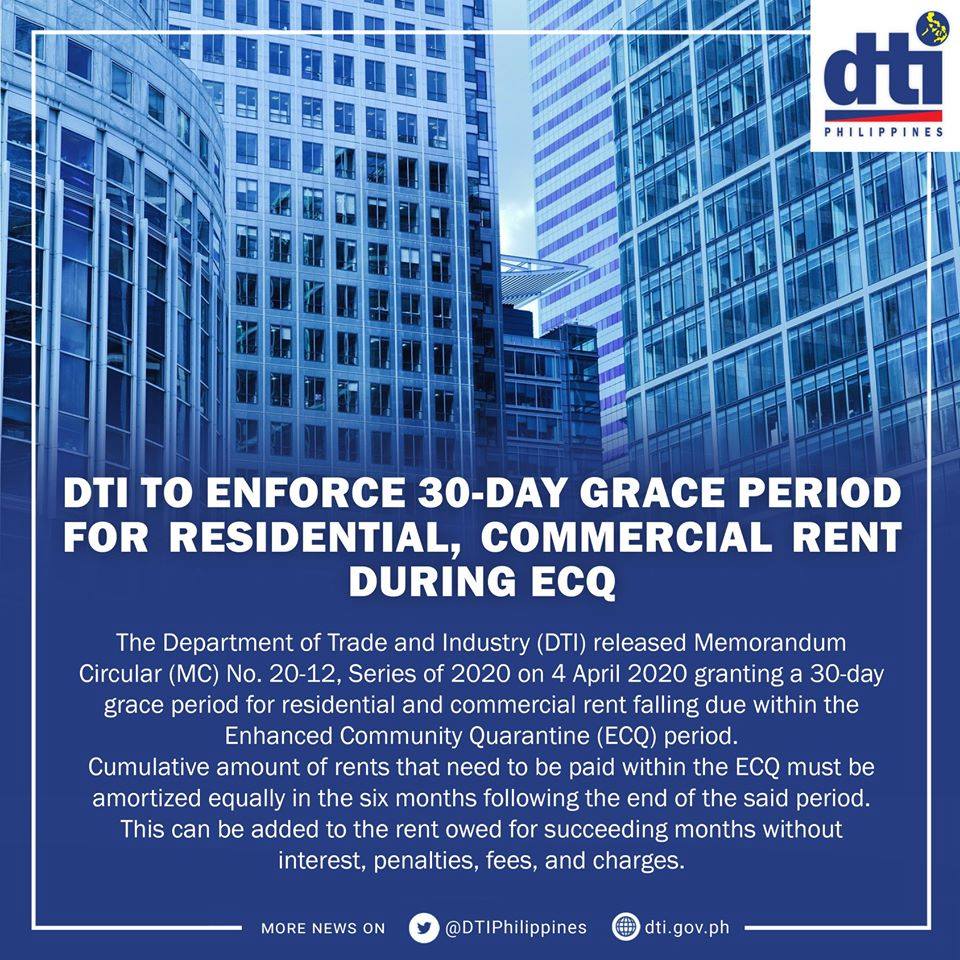DTI to act vs violations of 30-day grace period for residential, commercial rent during ECQ

CEBU CITY, Philippines—Owners of residential and commercial units who refuse to provide a grace period for the payment of rental that falls due during the enhanced community quarantine period faces imprisonment and/or a fine.
Republic Act (RA) No. 11469, or the “Bayanihan to Heal as One Act” says that lessors who are found guilty of refusing to provide the 30-day grace period to lessees will be penalized with imprisonment of not less than two months or a fine of not less than P10,000, or both.
Memorandum Circular (MC) No. 20-12, series of 2020 issued by the Department of Trade and Industry (DTI) on April 4 grants a 30-day grace period for residential and commercial rent falling due within the ECQ.
“To provide economic relief to Filipinos and MSMEs during the COVID-19 public health emergency, DTI is implementing these guidelines to ensure their survival during the ECQ, as well as to help brace them afterwards,” said Trade Secretary Ramon Lopez in a news release posted on the DTI website.
In line with RA No. 11469, DTI will enforce a 30-day grace period for commercial rents that fall within the duration of ECQ to give respite to MSMEs that have temporarily ceased operations.
These enterprises will also not incur interest, penalties, fees, and other charges under the grace period, the memorandum circular stated.
DTI will also ensure that a minimum of 30 days grace period will be granted for residential rent that falls due within the ECQ under the same terms.
Under the MC, the grace period will be determined as 30 calendar days following the last due date of the rent during the ECQ.
The total rental amount that has been unpaid within the ECQ should be payable in six monthly amortization following the end of the quarantine period. This can be added to the rent owed for succeeding months without interest, penalties, fees, and charges, according to the DTI MC.
On the other hand, lessors would not be obliged to refund residential and commercial rents already paid by lessees during the ECQ. However, lessors must grant a minimum of a 30-day grace period from the next due date of residential and commercial rents without interests and other penalties as well.
Likewise, the MC calls on lessors of MSMEs to extend their generosity to the lessees through:
• Total or partial waiving of commercial rents due during the ECQ;
• Grant a reprieve or discounted amount of commercial rents due after the ECQ; opening renegotiation of the Lease Term Agreements with lessees; and,
• Use other ways to mitigate the impact of the ECQ for MSMEs.
Lopez also stressed that eviction should not be imposed for failure to pay residential or commercial rent due within a 30-day period after the lifting of the ECQ.
“No Filipinos should lose their residence during the ECQ period. Moreover, the importance of MSMEs in jumpstarting our economy once the ECQ has been lifted cannot be understated,” he maintained.
“Through these measures, we ensure that our fellow Filipinos have a future after the ECQ with homes that they can live in and through jobs and employment provided by our MSMEs,” Lopez added.
Complaints of violations of the MC can be submitted to DTI in person or electronically by emailing the agency, either through the Fair Trade and Enforcement Bureau (FTEB) email address FTEB@dti.gov.ph or with the regional offices. Lessors who violate these guidelines will be required to answer the Notices of Violations (NOVs) issued by DTI. / dcb
Disclaimer: The comments uploaded on this site do not necessarily represent or reflect the views of management and owner of Cebudailynews. We reserve the right to exclude comments that we deem to be inconsistent with our editorial standards.

